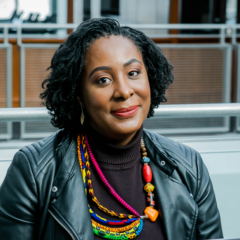Dr. Uju Anya (Carnegie Mellon University)

Where are the Black students in Bilingual Education?: Critical Race Pedagogy for Social Justice in Bilingual Education
To address racial inequity and how the identities, experiences, and specific needs of Black students have been mostly ignored in bilingual education, we must reckon with social justice problems of racism and anti-Blackness in research, school programs, curriculum, and instructional practices. This presentation explores how we can center Black students in bilingual education and introduces a critical race pedagogy for language teaching to promote antiracism, equity-mindedness, and greater inclusivity and belonging for marginalized populations.
Dr. Judith Kroll (University of California, Irvine)

Variation in language experience shapes the bilingual mind and brain
In the last three decades there has been an upsurge of research on the bilingual mind and brain. Although the world is multilingual, only recently have cognitive and language scientists come to see that the use of two or more languages provides a unique lens to examine the neural plasticity engaged by language experience. In this period we have learned that humans are far more plastic across the lifespan than previously understood. How does bilingualism change the mind and the brain? The openness to experience also reflects the influence of the social and cultural contexts in which languages are learned and used. It is now uncontroversial to claim that the bilingual’s two languages are continually active, creating a dynamic interplay across them. But there continues to be controversy about the consequences of that cross-language exchange for how cognitive and neural resources are recruited when a second language is learned and used actively and whether native speakers of a language retain privilege in their first acquired language. In the earliest months of life, minds and brains are tuned differently when exposed to more than one language from birth. That tuning has been hypothesized to open the speech system to new learning. For the oldest bilingual adults, there is evidence that a life of being bilingual confers protections against cognitive decline. In this talk, I illustrate the ways that recent studies have shown that the minds and brains of bilinguals are inherently complex and social, taking into account the variation in contexts in which the two languages are learned and used, and shaping the dynamics of cross-language exchange across the lifespan.